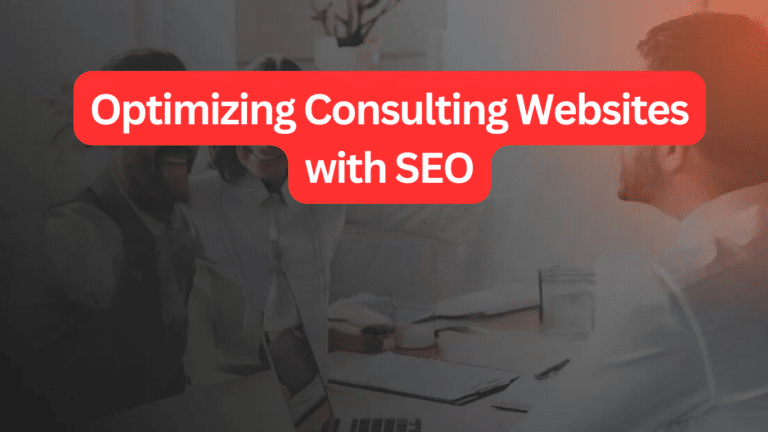Building an Effective Consultant Website
Essential Guide to Building an Consultant Website
Building an effective website is critical for consultants to establish their expertise, attract new clients, and grow their business online. Your website serves as the online hub and portfolio for your consulting services. With more and more buyers researching services online before making a purchase decision, having a professional website that engages visitors and converts them to leads is essential.
This comprehensive guide provides tips and best practices on how to create a results-driven consultant website that boosts your credibility, showcases your services, and generates more client inquiries.

Why Your Website is the Cornerstone of Your Consulting Business
For consulting firms, an effective website serves multiple important purposes:
Establishes Your Expertise and Thought Leadership
Your website content demonstrates your knowledge, skills, experience and unique insights in your field. Well-written service pages and blog posts position you as a subject matter expert and thought leader.
Attracts Ideal Prospects
Quality website content will attract more visitors organically through search engines. It gives prospects the information they need to evaluate you as a potential consultant for hire.
Converts Visitors to Leads
An effective website makes it easy for prospects to contact you or subscribe to your updates. Strong calls-to-action (CTAs) generate more sales inquiries.
Highlights Your Achievements
Your website can showcase client testimonials, case studies, portfolio projects, and consulting awards/accolades that build credibility.
Allows You to Scale Your Business
A website serves and markets to prospects 24/7. It automates lead generation so you can focus on delivering client projects.
Given the importance of your digital presence, invest the time and resources needed to make your website an effective business growth engine.
Elements of a High-Converting Consultant Website
The key elements that every consultant website needs include:
A Clear Value Proposition
Explain who you help, problems you solve, and outcomes you achieve for clients. Craft a unique positioning statement that conveys your competitive advantage.
Services Overview
Detail the specific consulting services and areas of expertise you offer. Organize services into logical main and subcategories.
Ideal Client Profiles
Describe the buyer personas, organizations, and industries you specialize in serving through your consulting engagements.
Case Studies and Testimonials
Share detailed examples of client success stories and projects. Spotlight client testimonials that vouch for your services.
Bio and Credentials
Summarize your professional background, education, certifications, speaking engagements, published works, and other qualifications.
Blog or Insights Section
Publish new blog content regularly to demonstrate expertise. Optimize articles for SEO keywords.
Prominent Calls-to-Action
Embed CTAs to contact you for a consultation, download an offer, sign up for a newsletter, etc.
Consultant Contact Information
Make your contact details easy to find with phone, email, social media links, and a contact form.
Optimizing the Structure and Navigation
Logical website structure and navigation impacts both user experience and SEO. Best practices include:
- Clean, uncluttered layout focusing on primary content
- Simple main nav menu with dropdowns for secondary pages
- Intuitive page hierarchy that flows well for users
- Easy access to contact and service overview pages
- Mobile responsive design
- Breadcrumb navigation showing page trail
- Prominent calls-to-action above the fold
- Footer menu with secondary links
- Sitemap page outlining full site content
Ensure your website architecture enables visitors to easily find information and engage with you.
Crafting Website Content That Converts
The content on each page of your site serves a purpose in moving prospects through the buying journey to become clients. Here are proven tips for higher converting website copy:
Lead With Client Benefits
Show immediate understanding of prospect needs and how your services deliver value. Focus on client outcomes over features.
Use Relatable Scenarios and Examples
Bring your services to life with specific examples and case studies for different clients. Paint a picture of success.
Align Content to Buyer Personas
Target content topics and messaging to appeal to your ideal client profiles. Address their goals and pain points.
Enable Self-Qualification
Help prospects evaluate quickly if your services fit their needs and you have the right expertise to deliver results.
Clarify Your Process
Explain how you engage with clients and deliver consulting services from start to finish. Build trust by setting expectations.
Add Social Proof Elements
Sprinkle in testimonials, logos, and recognizable client names as credible third-party endorsements.
Feature Benefit-Focused Headlines
Use concise, benefit-driven headlines and subheads that quickly convey your value proposition.
Write Scannable Content
Break up long blocks of text with section headings, bullet points, images, videos, charts, etc. for easy skimming.
Drive Action With CTAs
Embed calls-to-action to request a proposal, contact you, or download educational content to capture lead information.
Produce relevant, original website content optimized for your target personas. Refresh content regularly to position yourself as a thought leader.
Improving Website Conversion Rates
Design and optimize your website to convert as many visitors as possible into leads. Tactics to boost conversions include:
- Simplify registration forms – Only collect essential contact details needed to qualify leads. Don’t make visitors jump through hoops.
- Make forms mobile friendly – Ensure contact forms are easy to complete on mobile devices. Expand tap targets for fingertips.
- Reduce friction points – Eliminate unnecessary steps in conversion flows. For example, avoid requiring logins just to access gated content.
- Match content to visitor intent – Provide the information website visitors are seeking at different stages to move them smoothly through the sales funnel.
- Highlight credibility indicators – Feature logos, testimonials, and recognizable clients to establish trust and credibility. Prove you deliver results.
- Use exit-intent popups – Display targeted offers or contact forms when visitors are about to leave to capture leads.
- Retarget website visitors – Remarket your services across channels to visitors who previously engaged with your site content.
- Offer lead magnets – Give away a free valuable piece of content in exchange for a prospect’s contact information.
Continuously test and optimize elements on each page to improve conversion rates over time. Your website’s #1 goal is to generate quality leads.
Selecting the Right Web Hosting
Choosing the right web hosting provider is key to delivering fast, reliable website performance. As a consultant, look for these ideal web host features:
- 99.9% uptime guarantee – Your website should be available and loading quickly at all times.
- Optimized for speed – Fast page load speeds are critical for SEO and user experience.
- Secure – Select a host that offers standard security protections like SSL certificates, firewalls, and automatic software updates.
- Scalable – You want a hosting plan that can support traffic growth as your consulting business expands over time.
- ** backups** – The provider should perform regular backups to avoid any data loss.
- 24/7 support – Look for responsive customer support via live chat, phone, and email in case any issues arise.
- Simple control panel – The host should make it easy to update content, manage domains, track analytics, and more through their interface.
- Development tools – Options like staging environments and GIT integration help build and test site changes.
Shopping for a high-quality managed WordPress host that fits your budget is recommended to get your consultant website off the ground quickly and smoothly.
Promoting and Driving Traffic to Your Site
You need an effective strategy for getting your website content seen by your target prospects. Tactics to drive qualified website traffic include:
Search Engine Optimization
- Conduct keyword research to optimize pages for Google rankings.
- Produce targeted content around high-value SEO topics for your audience.
- Include keywords in titles, headers, content, image names, alt text, meta descriptions, etc.
- Get backlinks from relevant industry websites to improve domain authority.
Content Distribution
- Promote new website content and offers on LinkedIn, Twitter, Facebook.
- Repurpose content into blog posts, visuals for social media, videos, podcast interviews.
- Guest post on reputable industry blogs aligned with your services. They’ll link back to your site.
Paid Advertising
- Run Google Ads campaigns targeting customers actively looking for your services.
- Advertise on LinkedIn to reach professionals in your target sectors.
- Retarget people who have visited your website through paid display ads.
Email Marketing
- Send emails to contacts and newsletter subscribers to re-engage them.
- Promote new website content, offers, and resources through emails.
Driving a steady stream of relevant traffic to your site from multiple channels is essential for generating new business as a consultant. Set up analytics to track website visits, leads, and sales by source.
Choosing the Right Domain
Your domain name is one of the first impressions prospects have of your consulting business. An effective domain should:
- Align with your personal brand or company name for consistency
- Be short, simple, and easy to remember
- Contain your most powerful keywords for SEO benefits
- End with a .com extension for credibility
Avoid:
- Overly long or complex domain names
- Made up words or odd spellings
- Dashes, numbers, or hyphens
- Generic top-level domains like .info or .biz
Ideally, register a domain that matches your consultants name or brand. If yourname.com isn’t available, try using middle initials or adding “consulting” or a service keyword.
A domain name people can easily recall goes a long way in growing your consulting website traffic. Own the .com version if you can to prevent competitor confusion.
Analytics and Tracking to Optimize Performance
Website analytics provide the data and insights you need to understand your audience and continuously improve your consultant site’s performance. Make sure to implement:
Google Analytics
The free version tracks website sessions, top pages, traffic sources, visitor locations, behavior flows, conversions, and more. Gain actionable data to refine your website.
Lead Tracking
Install forms and scripts to track phone and form lead submissions. Monitor conversions by page and traffic source.
Goal tracking
Set up goals for desired actions – newsletter signups, content downloads, contact form submissions, etc. See which site areas drive the most conversions.
Page Speed monitoring
Page speed impacts SEO and visitor experience. Use free tools like Pingdom or Google PageSpeed Insights to catch issues.
Heatmaps
See exactly how visitors navigate and scroll on your site with heatmaps. Identify page elements getting the most attention.
Leverage analytics across your site to see what’s working well. Continuously test changes and enhance underperforming pages over time.
Building Trust and Credibility Through Design
Your website’s look and feel impacts visitor perceptions and trust. A few designer tips for conveying credibility include:
- Use branded colors – Pick one or two primary colors that match your logo for design accents.
- Show real clients – Display recognizable company logos and testimonials from reputable brands you’ve consulted for.
- Select professional imagery – Photos should evoke competence and expertise. Avoid overly generic stock photos.
- Highlight credentials – List awards, certifications, speaking engagements or publications that establish authority in your field.
- Embed social proof elements – Sprinkle in metrics like “Over 500 companies served” or testimonials throughout pages.
- Feature case studies – Share detailed examples of client results and transformations due to your work.
- Prioritize above-the-fold space for primary conversion actions over decorative visuals. Don’t let design overwhelm usability.
A polished, trustworthy website design reassures visitors you have the skills and experience to deliver results as a consultant.
Responsive Mobile Design
Today, the majority of web traffic comes from mobile devices. Having a responsive mobile website optimized for smartphones is now an essential best practice.
Key elements of mobile-friendly design include:
- Automatically adjusting layout – Content reflows flexibly based on screen width.
- Targeted tap sizes – Buttons and touch targets are large enough for easy tapping.
- Minimal horizontal scrolling – Site content fits screen width without excessive sideways scrolling.
- Fast mobile load speeds – Images and files are compressed and optimized for mobile connectivity.
- Mobile navigation menu – Hamburger menus or bottom nav bars enhance mobile experience.
- Legible mobile typography – Fonts are large enough to read easily on small screens.
- Simplified information architecture – Display only high-priority site content above the fold. Minimal scrolling.
- Mobile forms – Conversion forms validate and submit easily on mobile devices.
Testing your site on real devices ensures a seamless experience for mobile visitors to learn about your consulting services anywhere.
Tying Your Branding Together
A cohesive visual brand creates familiarity and trust across your website, business cards, proposals, presentations, and all external touchpoints. Ways to cultivate consistent branding include:
- Develop a logo and brand guidelines – Establish approved color palettes, fonts, and graphic treatments.
- Carry over branded colors and assets – Use visual brand elements like colors, iconography, and illustrations across materials.
- Maintain brand voice and tone – Communicate consistently with the right language and messaging everywhere.
- Feature headshot or profile photo – Help prospects connect your face with your personal brand and expertise.
- Showcase credentials – Highlight certifications, testimonials or case studies that reinforce your value proposition.
- Link to social profiles – Include LinkedIn, Twitter etc. buttons in website footers and bios to drive engagement.
Consistent branding allows you to stand out and build clear awareness for your consulting business over time through all consumer touchpoints.
Choosing the Right Technology Stack
The platforms and technology you use to build your consultant website also impact its capabilities. Some top options include:
Kleap
An automated website builder focused on helping consultants quickly launch effective sites to generate more leads. Provides pre-built templates, hosting, and lead capture.
Evaluate website builders based on your budget, design needs, and ease of use. Leverage tools that allow you to manage and update site content yourself.
WordPress
The most popular CMS, WordPress makes it easy to create and manage stylish websites. Choose a user-friendly web host with 1-click WordPress installation.
Webflow
A robust no-code web design platform for complete customization and animation capabilities. Easier for designers versus developers.
Wix
A user-friendly drag and drop website builder. Wix ADI even creates sites automatically based on prompts.
Squarespace
An all-in-one web publishing and ecommerce solution to create sites, galleries and online stores. Includes built-in SEO tools.
Leadpages
Specialized landing page templates to promote opt-ins, events, webinars and generate leads. Integrates easily with emails and payments.
Evaluate website builders based on your budget, design needs, and ease of use. Leverage tools that allow you to manage and update site content yourself.
Launching and Iterating Your Website
Launching your consultant website is just the first step. Maintenance and continuous improvements over time are key to driving results. Best practices include:
Start Fresh
Give your site a soft launch with a simple message about your full launch coming soon. This allows you to test and polish before going fully live.
Formally Announce
Promote your new website across your marketing channels and network when it’s ready for primetime. Welcome visitors.
Monitor Traffic and Conversions
Review analytics regularly to see how visitors navigate your new site. Watch for navigation errors and usage trends.
Look for Improvement Opportunities
Conduct audits to identify ways to optimize page speed, enhance user experience, improve conversions, etc.
Keep Content Fresh
Add new blog articles, case studies and videos consistently over time. Showcase your latest work and ideas.
Promote New Content
Share your newest website content, offers and resources across social media and email. Resurface old content too.
Retain an Optimization Mindset
Continue testing and tweaking your website for maximum performance. Evolve the design and content to stay current.
Dedicating time regularly to maintain and enhance your consultant site ensures it continues to generate new business rather than going stagnant.
Key Takeaways
Building a results-driven consultant website takes strategy, creativity and focus. By following the tips and best practices outlined in this guide, you can develop an effective online hub to demonstrate your expertise, attract your ideal clients, and grow your consulting business.
The essentials to remember include:
- Craft a clear value proposition and client-focused content
- Design an intuitive site architecture and navigation
- Showcase credentials, testimonials and case studies
- Optimize for conversions with CTAs and lead gen forms
- Promote your site content across marketing channels
- Enable easy mobile responsiveness
- Maintain consistent branding across touchpoints
- Track analytics for continuous optimization
Invest in your digital presence and watch your consultant website become a powerful engine for business growth and revenue. Deliver results, and the clients will come.
Frequently Asked Question
1. What is a consultant website?
A consultant website is a digital platform where consultants can showcase their services, expertise, and credentials online. It serves as a hub for potential clients to learn more about the consultant and their offerings.
2. Why do I need a consultant website?
Having a consultant website provides you with a professional online presence, helps you reach a wider audience, and allows potential clients to easily find and contact you. It also builds credibility and trust in your expertise.
3. What should I include on my consultant website?
Your website should include essential elements like a homepage, about page, services offered, client testimonials, a blog or resources section, and contact information. Depending on your niche, you may also want to add a portfolio or case studies.
4. How can I make my consultant website stand out from the competition?
To stand out, focus on clear and concise messaging, high-quality content, professional design, user-friendly navigation, and a unique value proposition that highlights your strengths and differentiates you from competitors.
5. Do I need to hire a professional web designer to create my consultant website?
While hiring a professional web designer can result in a polished and custom website, it’s not always necessary. There are user-friendly website builders and templates available that allow you to create a functional and visually appealing site on your own.
6. What is the importance of responsive design for a consultant website?
Responsive design ensures that your website looks and functions well on all devices, including smartphones, tablets, and desktop computers. It is crucial for providing a seamless user experience and improving your site’s search engine rankings.
7. How do I optimize my consultant website for search engines (SEO)?
SEO involves using relevant keywords, creating high-quality content, optimizing images, improving website speed, and obtaining backlinks. These strategies help your website rank higher in search engine results, making it more visible to potential clients.
8. Should I include a blog on my consultant website?
Yes, a blog can be a valuable addition to your consultant website. It allows you to showcase your expertise, share industry insights, and improve your website’s SEO. Regularly updated content can also engage visitors and keep them coming back.
9. What should I consider in terms of security for my consultant website?
Security is essential to protect your website and client data. Use strong passwords, keep software and plugins up to date, use SSL certificates for encryption, and regularly back up your website to prevent data loss.
10. How can I track the performance of my consultant website?
You can use website analytics tools like Google Analytics to track metrics such as website traffic, user behavior, and conversion rates. Monitoring these metrics helps you make informed decisions to improve your website’s performance.
Conclsuion
In conclusion, building an effective consultant website is not merely a digital formality but a strategic cornerstone for success in the modern consulting landscape. A well-designed website serves as your digital storefront, showcasing your expertise, credibility, and the value you offer to potential clients. By following best practices in web design, content creation, and user experience, you can create a powerful online presence that sets you apart from competitors and opens doors to new opportunities.














